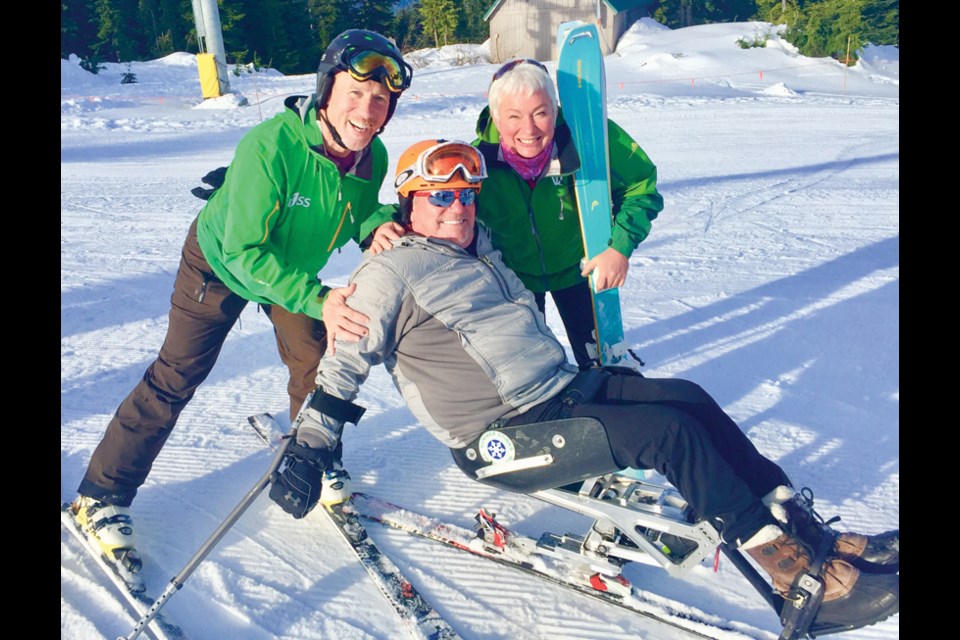Anne Bethune calls them her Kleenex moments – those first cautious turns across the slope.
Unfortunate life circumstances, along with will and determination, bring Bethune’s students to the mountain. For Bethune, it’s a perfect mix of benevolence and a love of skiing that keeps her motivated.
“And there’s never been a reason in 32 years to stop coming back,” she says.
Bethune is the president of Vancouver Adaptive Snow Sports, which runs skiing and snowboarding programs for persons with a disability, ranging from visual impairment, spinal cord injury and missing limbs, on Seymour, Grouse and Cypress mountains.
Reaching the slopes under those iconic lights on The Cut run was much like reaching for the stars before the adaptive program started 44 years ago on Grouse.
Each season, Bethune makes new friendships with skiers young and old, with many students leaving a lasting impression on her, including one man who almost never made it to the mountain.
“He had a car accident, flipped his car and should have died,” explains Bethune. “Punctured both lungs, the right side of his body was pretty well crushed.”
The man survived the crash and his body healed over the course of a few years, with the exception of his right lower leg. Chronic pain and challenges led to the amputation of his foot, but not the man’s sense of adventure. He went back to skiing.
“And one of my Kleenex moments was being on the hill with him, his wife and his two daughters who had never ever skied with him before. It was just beautiful,” says Bethune.
Another story that warms Bethune’s heart on the slopes is that of a 13-year-old boy born with cerebral palsy.
“The most significant challenge for him is that he’s progressively also losing his eyesight and becoming blind,” explains Bethune.
The boy’s mom and dad cheer from the sidelines as he carves down the slope using an adaptive walker ski with assistance from a couple of snow angels, better known as VASS volunteers, steering him from behind.
“It’s just very emotional as you can imagine,” says Bethune. We’re giving them hope as a family and something that they can do together.”
Students of all ages and disabilities can access the slopes through the use of adaptive equipment and/or specialized instruction.
A paraplegic sits in a bucket seat suspended above a ski, using stabilizing outriggers attached to their hands to assist with balance and steering for every turn.
Volunteers drive the adaptive snow sports program. Certified instructors ski or snowboard behind the students, using a set of reins to help guide them down the mountain.
There are approximately 150 students of varying abilities who go through one of the six-week VASS programs, which include snowboarding, sit-ski, stand-up skiing and advanced adaptive ski racing. There’s also a growing program for students with autism.
VASS delivers about 1,000 lessons each season. Considering the instructor-student ratio is 2:1, or sometimes even 3:1, volunteers are in short supply. There is currently a waitlist for all the programs.
“We’re just at this squeeze point of students wanting to access our programs and we need more instructors to come and volunteer,” says Bethune. “We can’t do anything without great people to come and help us out.”
A basic requirement for VASS volunteers is being an intermediate skier or above. Even if you’re not the strongest skier, there are other skills which can go a long way in the program, explains Bethune.
“Some people have knowledge of disabilities and that can be helpful, or a teaching background,” she says.
The minimum time commitment is once a week for six weeks. Some volunteers sign up for multiple programs, which run throughout the week on the mountains.
While the certified Canadian Association for Disabled Skiing instructor courses are full for this season, volunteers can still be very helpful on the hill as an assistant.
“Another 100 volunteers would get 50 students off the waitlist,” says Bethune, of wanting everyone to experience this North Shore rite of passage. “It just breaks my heart to imagine these kids, who could ski just with a little assistance or adaptive aid or specialized teaching techniques, are sitting at home.”
For at least one student, VASS has changed his life for the better. A successful actor, the guy wasn’t the same after his pair of brain tumours were removed.
“He couldn’t remember his lines. He couldn’t continue his vocation. And he was depressed,” says Bethune.
In her capacity as an occupational therapist, Bethune spoke at a brain injury support group that the man was at. She told the astonished members, “You know, you guys can come skiing.”
Bethune says it’s easy to lose your social outlet when trying to navigate a new life with a brain injury. The man from the support group found courage to make it to the mountain, where he found new friends.
“He didn’t think that he could ski – it has been 25 years since had skied,” says Bethune.
The man took to the slopes like a champion and became an instructor the next year.
He later learned to snowboard, became an instructor, joined the race team, and just took his race coaching.
“And that’s what I call the VASS magic,” says Bethune.



